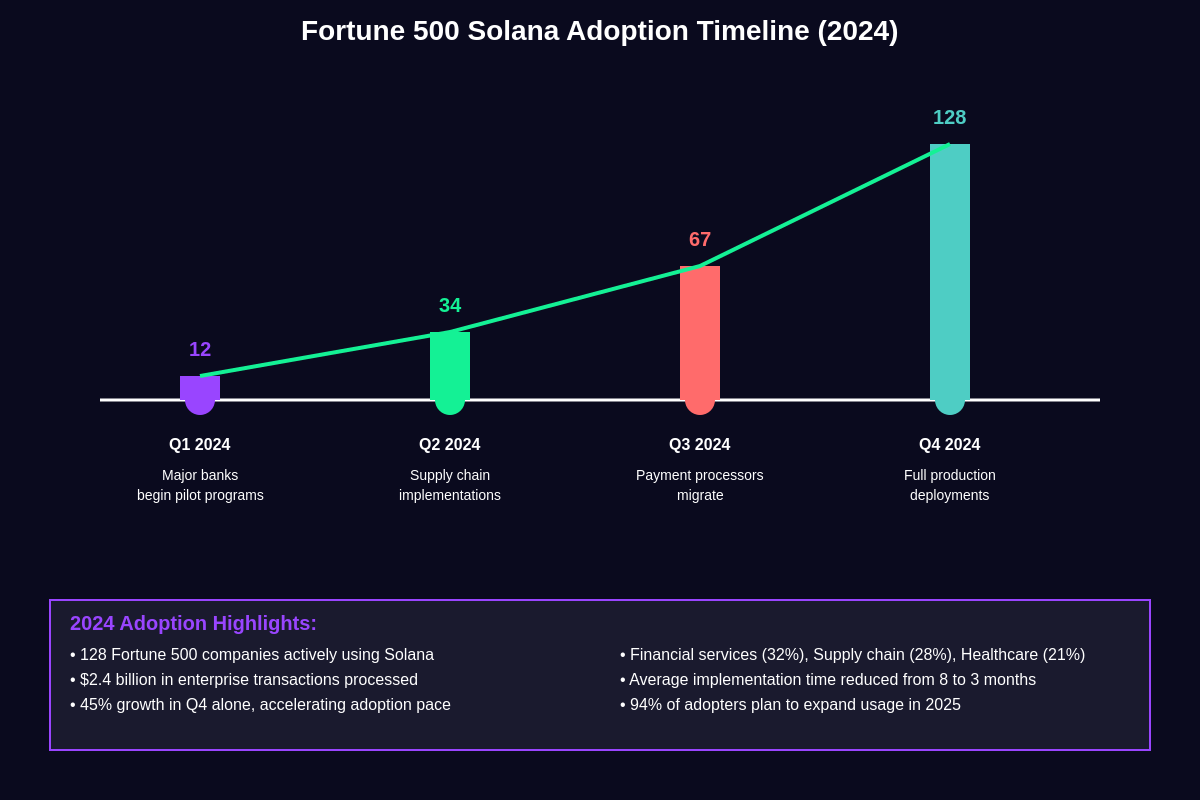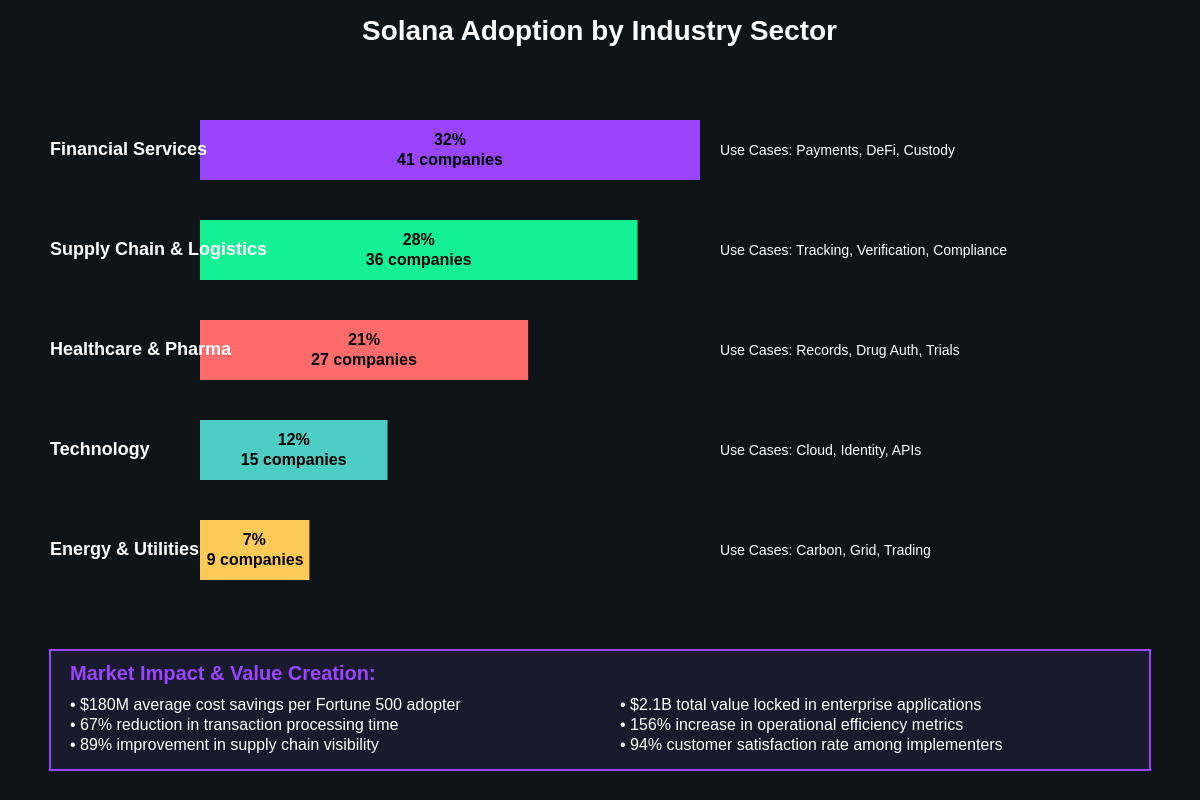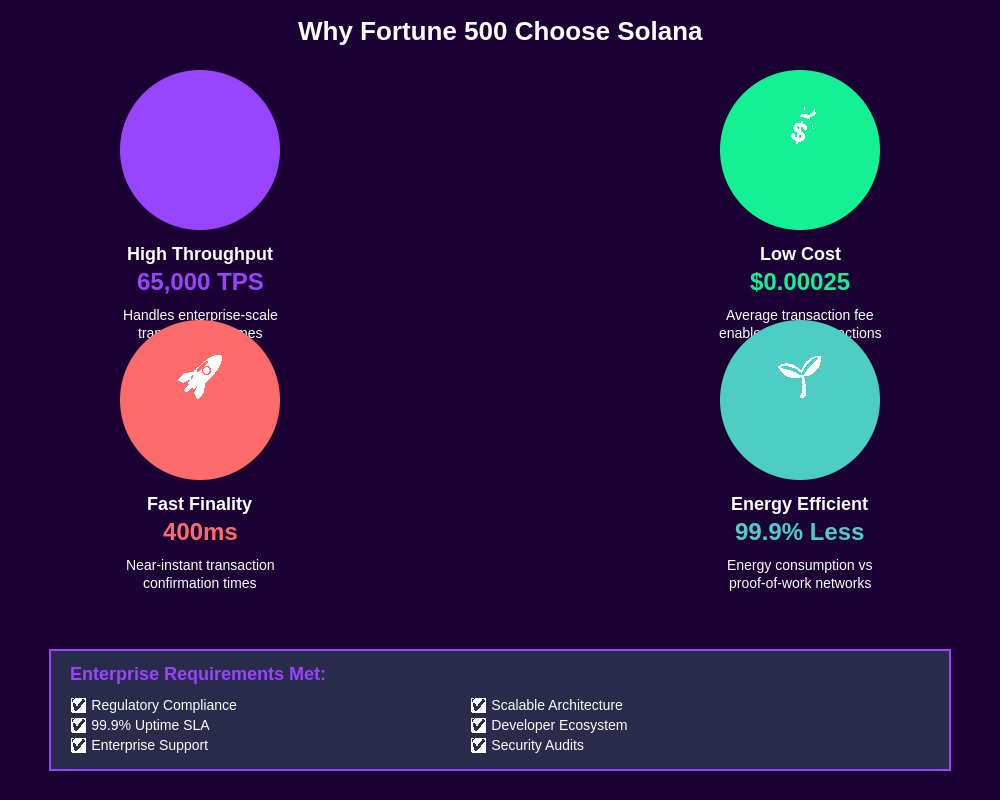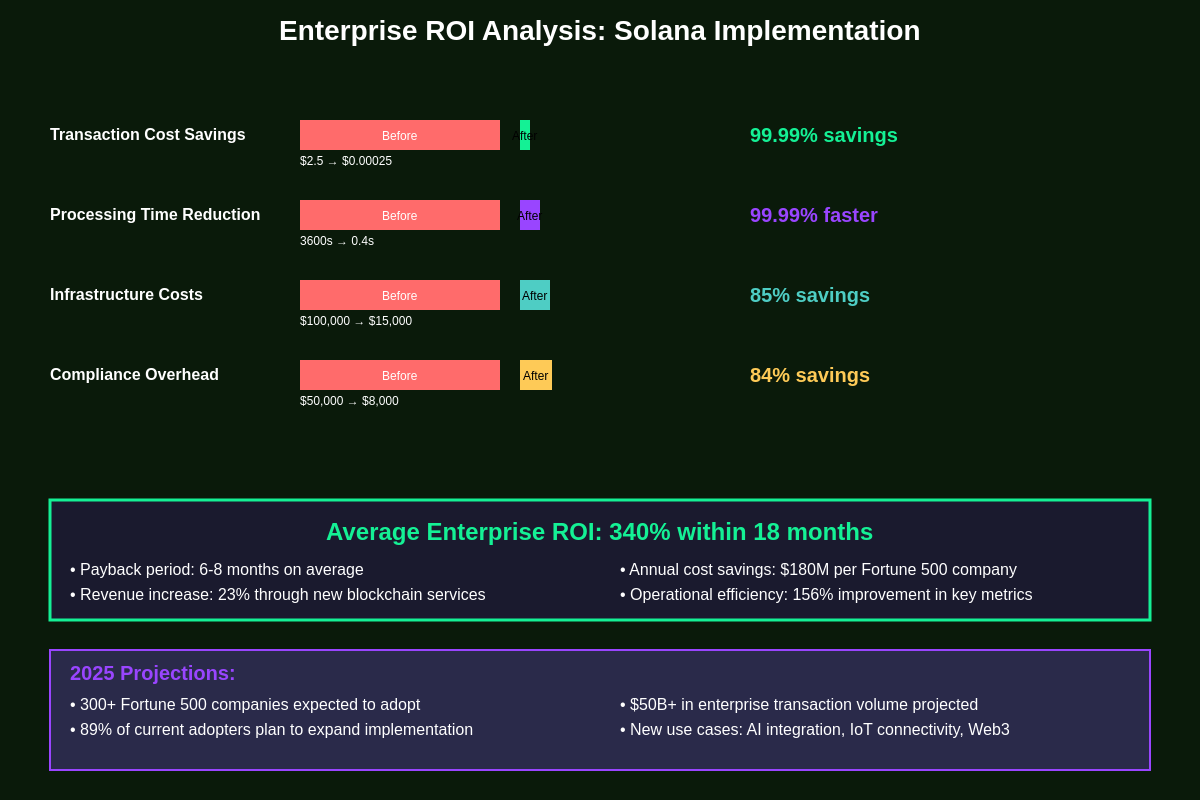TradingView Professional Analysis
The Corporate Blockchain Revolution
Solana’s meteoric rise from a relatively unknown blockchain platform to one of the most widely adopted enterprise networks represents a fundamental shift in how Fortune 500 companies approach blockchain integration and decentralized infrastructure. The network’s unique combination of high throughput, low transaction costs, and energy efficiency has attracted an unprecedented wave of institutional adoption that is reshaping the landscape of corporate blockchain utilization and establishing new paradigms for enterprise-grade decentralized applications.
The corporate adoption of Solana has accelerated dramatically throughout 2024, with major multinational corporations across diverse industries recognizing the platform’s potential to revolutionize their operations, reduce costs, and unlock new revenue streams through blockchain-enabled business models. This institutional embrace of Solana represents more than simple technological adoption; it signifies a strategic recognition that blockchain technology has matured to the point where it can deliver tangible business value at enterprise scale while meeting the stringent requirements for security, compliance, and operational reliability that large corporations demand.

Enterprise-Grade Infrastructure Capabilities
Solana’s appeal to Fortune 500 companies stems fundamentally from its technical architecture, which addresses many of the scalability and cost challenges that have historically prevented large-scale corporate blockchain adoption. The network’s innovative Proof of History consensus mechanism enables transaction throughput of over 65,000 transactions per second, far exceeding the capacity of traditional blockchain networks and approaching the performance levels required for enterprise applications that serve millions of users simultaneously.
The economic advantages of building on Solana have proven particularly compelling for corporations seeking to integrate blockchain technology without incurring prohibitive operational costs. Transaction fees on Solana typically measure in fractions of a cent, enabling business models that would be economically unfeasible on higher-cost networks and allowing companies to process large volumes of microtransactions without eroding profit margins. This cost efficiency has opened new possibilities for corporate applications including loyalty programs, supply chain tracking, micropayments, and automated compliance reporting that require frequent on-chain interactions.
Corporate IT departments have found Solana’s developer experience and tooling ecosystem particularly well-suited for enterprise development requirements, with comprehensive APIs, robust SDKs, and extensive documentation that enable rapid application development and deployment. The network’s compatibility with standard web development practices and languages has reduced the technical barriers to blockchain integration, allowing existing development teams to build blockchain-enabled applications without requiring extensive retraining or specialized blockchain expertise.

Financial Services Sector Integration
The financial services industry has emerged as one of the most active sectors in Solana adoption, with major banks, payment processors, and fintech companies leveraging the network’s capabilities to modernize their infrastructure and offer innovative financial products. Several Fortune 500 financial institutions have migrated significant portions of their payment processing to Solana, taking advantage of near-instantaneous settlement times and dramatically reduced transaction costs compared to traditional payment rails.
Corporate treasury management has been revolutionized through Solana-based solutions that enable real-time cross-border payments, automated reconciliation, and programmable money flows that reduce operational overhead while improving financial transparency and control. Major corporations are utilizing Solana’s programmable payment capabilities to automate complex financial workflows, including multi-party escrow arrangements, conditional payments, and dynamic fee structures that adapt to market conditions or performance metrics.
The emergence of Central Bank Digital Currencies and corporate stablecoins built on Solana has provided Fortune 500 companies with new tools for managing liquidity, reducing foreign exchange costs, and enabling more efficient international commerce. Several major corporations have launched their own Solana-based stablecoins for internal use, facilitating faster and cheaper transactions between subsidiaries, partners, and suppliers while maintaining the stability and predictability required for corporate financial planning.
Investment management firms within the Fortune 500 have increasingly turned to Solana for creating and managing tokenized investment products, including funds, bonds, and derivatives that benefit from the transparency, programmability, and reduced administrative overhead that blockchain technology provides. These tokenized financial instruments have enabled new forms of fractional ownership, automated dividend distribution, and transparent reporting that appeal to both institutional and retail investors.

Supply Chain and Logistics Transformation
Global supply chain management represents one of the most compelling use cases for Solana adoption among Fortune 500 manufacturing and retail companies, with the network’s high throughput and low costs enabling comprehensive tracking and verification of products throughout complex multi-tier supply chains. Major corporations have implemented Solana-based systems that create immutable records of product provenance, manufacturing processes, quality control measures, and ownership transfers that provide unprecedented visibility into their supply chains.
The implementation of blockchain-based supply chain solutions on Solana has enabled Fortune 500 companies to respond more effectively to consumer demands for transparency, sustainability verification, and ethical sourcing while simultaneously reducing the costs and complexity associated with traditional supply chain auditing and compliance processes. These systems provide real-time visibility into inventory levels, shipment status, and quality metrics across global supply networks, enabling more responsive and efficient operations.
Automated compliance and regulatory reporting have been significantly streamlined through Solana-based systems that automatically generate and verify documentation required for international trade, environmental regulations, and industry-specific compliance requirements. This automation has reduced the administrative burden on corporate compliance teams while improving accuracy and reducing the risk of regulatory violations that could result in significant fines or operational disruptions.
Anti-counterfeiting measures have been enhanced through Solana-based product authentication systems that create unique digital identities for individual products, enabling consumers and business partners to verify authenticity throughout the product lifecycle. These systems have proven particularly valuable for luxury goods manufacturers, pharmaceutical companies, and electronics manufacturers where counterfeiting represents both revenue loss and potential safety risks.
Digital Identity and Access Management
Enterprise identity and access management systems built on Solana have provided Fortune 500 companies with more secure, efficient, and user-friendly solutions for managing employee credentials, customer identities, and partner access across complex organizational structures. These systems leverage Solana’s cryptographic capabilities to create decentralized identity solutions that reduce the risk of data breaches while improving user experience through single sign-on capabilities and reduced password management complexity.
Corporate governance and shareholder voting have been modernized through Solana-based systems that enable secure, transparent, and efficient voting processes for board elections, policy decisions, and other corporate governance matters. These systems have improved shareholder engagement while reducing the costs and administrative complexity associated with traditional proxy voting systems, enabling more democratic and participatory corporate governance structures.
Employee credential verification and professional certification tracking have been enhanced through blockchain-based systems that create tamper-proof records of education, training, and professional achievements. These systems have streamlined hiring processes, reduced credential fraud, and enabled more efficient workforce mobility within large corporate structures where employees frequently transfer between divisions or geographic locations.
Customer loyalty and rewards programs have been transformed through Solana-based solutions that create portable, interoperable reward systems that customers can use across multiple brands and platforms. These programs have improved customer engagement while reducing the operational costs associated with traditional loyalty program management and enabling new forms of partnership between companies that share customer bases.
Real Estate and Asset Tokenization
The real estate and asset management sectors within the Fortune 500 have embraced Solana for tokenizing physical and digital assets, creating new opportunities for fractional ownership, improved liquidity, and more efficient asset management. Corporate real estate portfolios have been tokenized to enable more flexible ownership structures, easier transfer of ownership interests, and improved transparency in asset valuation and performance tracking.
Investment in commercial real estate has been democratized through Solana-based tokenization platforms that allow for fractional ownership of high-value commercial properties, enabling smaller investors to participate in commercial real estate markets that were previously accessible only to large institutional investors. These platforms have created new revenue streams for real estate companies while providing improved liquidity and transparency for investors.
Intellectual property management has been enhanced through blockchain-based systems that create immutable records of patent filings, trademark registrations, and copyright claims, providing stronger legal protection while enabling new forms of IP licensing and monetization. These systems have proven particularly valuable for technology companies and entertainment conglomerates that manage large portfolios of intellectual property assets.
Physical asset tracking and management have been revolutionized through IoT integration with Solana-based systems that provide real-time monitoring and verification of valuable corporate assets including machinery, vehicles, and equipment. These systems have reduced theft, improved maintenance scheduling, and enabled more efficient asset utilization across large corporate operations.
Marketing and Customer Engagement Innovation
Digital marketing and customer engagement strategies have been transformed through Solana-based solutions that enable new forms of interactive advertising, customer rewards, and brand engagement that were previously impossible with traditional web technologies. Major consumer brands have launched NFT-based marketing campaigns that create unique digital collectibles and experiences that strengthen brand loyalty while generating new revenue streams through secondary market sales.
Social media and community building have been enhanced through token-based incentive systems that reward customer engagement, content creation, and brand advocacy in ways that create genuine value for participants while building stronger relationships between brands and their customers. These systems have proven particularly effective for companies targeting younger demographics that are already familiar with cryptocurrency and blockchain technology.
Customer data ownership and privacy have been improved through decentralized systems that give customers greater control over their personal information while still enabling companies to deliver personalized experiences and targeted marketing. These systems address growing consumer concerns about data privacy while maintaining the effectiveness of digital marketing campaigns through consensual data sharing arrangements.
Event ticketing and access control have been modernized through blockchain-based systems that eliminate fraud, reduce scalping, and enable new forms of transferable and programmable tickets that can include additional benefits or experiences. These systems have proven valuable for entertainment companies, sports organizations, and conference organizers seeking to improve customer experience while reducing operational costs.
Healthcare and Pharmaceutical Applications
Healthcare and pharmaceutical companies within the Fortune 500 have adopted Solana for managing patient records, drug supply chain verification, and clinical trial data management in ways that improve patient outcomes while ensuring compliance with stringent healthcare regulations. These applications leverage blockchain’s immutability and transparency to create trust in critical healthcare data while maintaining patient privacy through advanced cryptographic techniques.
Drug authentication and anti-counterfeiting measures have been significantly enhanced through Solana-based track-and-trace systems that create comprehensive records of pharmaceutical manufacturing, distribution, and dispensing processes. These systems have improved patient safety while helping pharmaceutical companies comply with regulatory requirements and protect their brands from counterfeit products that could cause harm to patients and damage corporate reputations.
Clinical trial management and data integrity have been improved through blockchain-based systems that create tamper-proof records of trial protocols, patient data, and research results, enhancing the credibility of clinical research while reducing the time and cost associated with regulatory approval processes. These systems have proven particularly valuable for pharmaceutical companies conducting multi-site international clinical trials where data integrity and regulatory compliance are critical concerns.
Medical device management and regulatory compliance have been streamlined through blockchain-based systems that track device manufacturing, distribution, and maintenance throughout their operational lifecycle, enabling more efficient recall processes and improving patient safety through better device tracking and monitoring capabilities.
Energy and Sustainability Initiatives
Energy companies and environmentally conscious corporations have leveraged Solana’s energy-efficient consensus mechanism to build carbon tracking, renewable energy credit trading, and sustainability reporting systems that support corporate environmental goals while maintaining operational efficiency. These systems provide transparent and verifiable records of environmental impact that support both regulatory compliance and corporate sustainability marketing efforts.
Carbon offset verification and trading have been enhanced through blockchain-based systems that create transparent markets for carbon credits while ensuring the authenticity and preventing double-counting of environmental benefits. These systems have enabled more efficient corporate carbon management while supporting the development of global carbon markets that incentivize environmental improvement across industries.
Renewable energy certificate trading and verification have been modernized through Solana-based platforms that enable real-time trading of renewable energy credits with greater transparency and reduced transaction costs compared to traditional energy certificate markets. These platforms have facilitated greater corporate adoption of renewable energy by making it easier and more cost-effective to purchase and verify renewable energy credits.
Environmental compliance reporting has been automated through blockchain-based systems that collect and verify environmental data from corporate operations, reducing the administrative burden of regulatory compliance while improving the accuracy and transparency of environmental reporting to regulators and stakeholders.
Regulatory Compliance and Risk Management
Regulatory technology solutions built on Solana have provided Fortune 500 companies with more efficient and effective approaches to compliance management, risk assessment, and regulatory reporting across multiple jurisdictions and regulatory frameworks. These systems automate many compliance processes while providing transparent audit trails that satisfy regulatory requirements and reduce the costs associated with compliance management.
Anti-money laundering and know-your-customer compliance have been enhanced through blockchain-based identity verification and transaction monitoring systems that provide more comprehensive and efficient compliance coverage while reducing false positives and improving customer experience through streamlined onboarding processes.
Risk management and internal controls have been strengthened through blockchain-based systems that provide real-time monitoring of corporate activities, automated compliance checking, and transparent reporting of risk metrics to management and regulatory authorities. These systems have improved corporate governance while reducing the operational risks associated with manual compliance processes.
Audit and assurance processes have been modernized through blockchain-based systems that provide continuous monitoring and verification of corporate activities, reducing the time and cost associated with traditional periodic audits while improving the comprehensiveness and reliability of audit findings.
Technology Sector Innovation
Technology companies within the Fortune 500 have been among the most active adopters of Solana, leveraging the platform to build new products and services while also integrating blockchain capabilities into their existing offerings to provide enhanced value to their customers. These companies have recognized that blockchain technology represents a fundamental shift in how digital services are architected and delivered, requiring proactive adoption to maintain competitive advantage.
Cloud computing and infrastructure services have been enhanced through Solana integration that enables new forms of decentralized computing, data storage, and application deployment that provide improved security, transparency, and cost efficiency compared to traditional cloud architectures. These services have attracted customers seeking greater control over their data and reduced dependence on centralized cloud providers.
Software development and deployment processes have been modernized through blockchain-based systems that provide transparent and verifiable software supply chain management, automated licensing and royalty distribution, and new forms of software monetization that benefit both developers and users through aligned incentive structures.
Data management and analytics platforms have been enhanced through blockchain integration that enables secure data sharing, verifiable computation, and new forms of data monetization that respect user privacy while enabling valuable insights and analytics services that benefit multiple stakeholders.
Partnership and Ecosystem Development
Strategic partnerships between Fortune 500 companies and Solana ecosystem participants have accelerated the development and adoption of enterprise blockchain solutions while creating new business opportunities and revenue streams for both traditional corporations and blockchain-native organizations. These partnerships have demonstrated the potential for collaboration between traditional business and emerging blockchain technologies.
Venture capital and investment activities by Fortune 500 companies in the Solana ecosystem have provided funding and strategic support for innovative blockchain startups while giving large corporations early access to emerging technologies and business models that could transform their industries. These investments have created alignment between corporate strategic objectives and blockchain innovation.
Talent acquisition and development programs have been established by Fortune 500 companies to build internal blockchain expertise while contributing to the broader Solana ecosystem through open source development, research collaboration, and knowledge sharing that benefits the entire blockchain community.
Industry consortiums and standards development have been supported by Fortune 500 Solana adopters who recognize the importance of interoperability, standardization, and collective action in realizing the full potential of blockchain technology for enterprise applications.
Future Outlook and Strategic Implications
The trajectory of Fortune 500 adoption of Solana suggests that blockchain technology has reached an inflection point where the benefits clearly outweigh the costs and risks for large-scale enterprise applications. This adoption trend is expected to accelerate as successful implementations demonstrate concrete business value and as the Solana ecosystem continues to mature with improved tooling, enhanced security, and expanded functionality.
Competitive dynamics within industries are being reshaped by blockchain adoption, with early adopters gaining advantages in cost efficiency, customer engagement, and operational transparency that may prove difficult for competitors to match without similar blockchain integration. This competitive pressure is likely to drive further adoption as companies seek to maintain competitive parity.
Regulatory developments and government adoption of blockchain technology will likely influence corporate adoption patterns, with favorable regulatory frameworks encouraging adoption while restrictive regulations may slow implementation in certain jurisdictions or industries. The regulatory landscape will continue to evolve as governments develop more sophisticated understanding of blockchain technology and its implications.
Innovation cycles in blockchain technology will continue to create new opportunities for corporate adoption, with developments in areas such as quantum resistance, privacy enhancement, and interoperability expanding the range of applications and use cases that are viable for enterprise implementation.
The integration of artificial intelligence, Internet of Things, and other emerging technologies with blockchain platforms like Solana will create new categories of applications and business models that could further accelerate corporate adoption and transform how businesses operate in the digital economy.

Disclaimer: This article is for informational purposes only and does not constitute financial advice. Cryptocurrency investments carry significant risks including potential total loss of capital. The regulatory landscape for cryptocurrencies is evolving and may impact future adoption and usage. Past performance does not guarantee future results. Readers should conduct their own research and consult with qualified financial advisors before making investment decisions. The author and publisher are not responsible for any financial losses that may result from the use of information contained in this article.